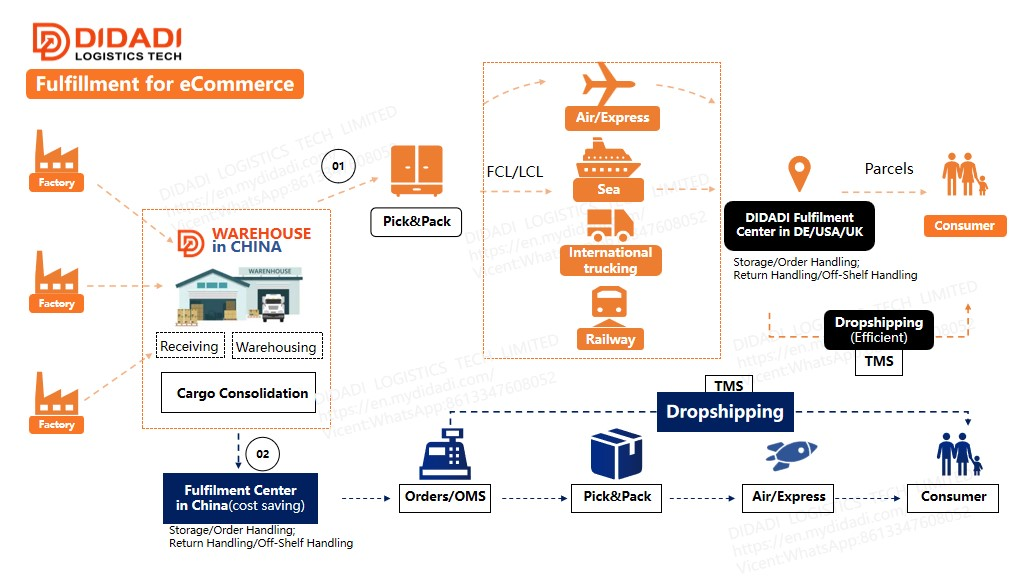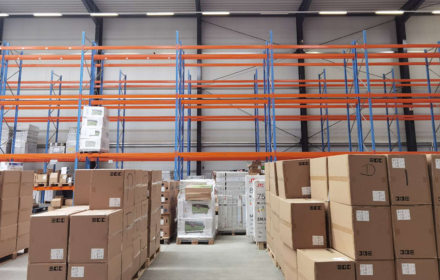SCM & Logistics: What’s the Difference

Effective supply chain management (SCM) is essential for optimizing inbound and outbound logistics processes, as well as fostering business growth.
A single disruption within the e-commerce supply chain can have a domino effect, resulting in reduced profit margins, lost revenue, sluggish supply chain velocity, and diminished customer satisfaction.
Both SCM and logistics are very important for global end-to-end e-commerce business which contains a comprehensive suite of solutions that cover every aspect of an online retail business.
In this blog post, we will explore the definitions of SCM and logistics, discuss their similarities and differences, highlight their importance in business, and delve into how DIDADI can simplify supply chain management and logistics.
Supply chain management refers to the coordination and integration of all activities involved in the production, procurement, conversion, and delivery of goods or services from the point of origin to the point of consumption.
It encompasses planning, sourcing, manufacturing, inventory management, and logistics, with the aim of creating value for customers while maximizing efficiency and minimizing costs.
Logistics, on the other hand, specifically focuses on the movement and storage of goods and related information within a supply chain.
It involves the management of transportation, warehousing, inventory control, packaging, and handling, as well as the coordination of these activities to ensure the smooth flow of goods from suppliers to customers.
How are supply chain management and logistics the same?
Both supply chain management and logistics play critical roles in the overall functioning of a business. They are interconnected and rely on each other for effective operations. SCM and logistics aim to optimize processes, enhance customer satisfaction, and drive profitability.
While supply chain management encompasses the broader strategic coordination of activities across the entire supply chain, logistics is a subset of these activities that specifically deals with the operational aspects of transporting and storing goods.
Logistics is one of the key components of supply chain management, and both play crucial roles in ensuring the smooth flow of products and services to customers.
How are supply chain management and logistics different?
The main difference lies in their scope. While logistics focuses on the movement and storage of goods, SCM takes a broader perspective and encompasses the entire supply chain from sourcing to delivery.
SCM involves strategic planning, collaboration with suppliers and partners, demand forecasting, and customer relationship management, in addition to logistics activities.

In summary, while supply chain management encompasses the broader strategic coordination of activities across the entire supply chain, logistics is a subset of these activities that specifically deals with the operational aspects of transporting and storing goods.
Logistics is one of the key components of supply chain management, and both play crucial roles in ensuring the smooth flow of products and services to customers.

Utilizing logistics and supply chain management practices offers several benefits to businesses:
Cost Reduction
Efficient supply chain management and logistics practices help streamline operations, reduce waste, and optimize inventory levels.
This can lead to cost savings through improved procurement processes, better inventory management, reduced transportation expenses, and minimized holding costs.
Improved Customer Satisfaction
For Direct-to-consumer (DTC) brands, a well-managed supply chain and logistics network enable faster and more accurate order fulfillment, on-time deliveries, and improved product availability. Meeting customer demands promptly and efficiently enhances customer satisfaction and loyalty.
Enhanced Efficiency and Productivity
By optimizing processes and eliminating bottlenecks, supply chain management and logistics practices improve overall efficiency and productivity. This can lead to shorter lead times, reduced order processing time, and improved resource allocation.
Better Inventory Management
Effective supply chain management practices enable businesses to optimize inventory levels by accurately forecasting demand, improving inventory visibility, and implementing inventory control measures. This reduces inventory holding costs while ensuring product availability.
Increased Agility and Adaptability
A well-designed supply chain and logistics system can enhance a company’s ability to respond quickly to changes in market demand, supply disruptions, or other unforeseen events. This agility allows businesses to adapt and adjust their operations swiftly and effectively.
Stronger Supplier Relationships
Effective supply chain management practices involve close collaboration and communication with suppliers. Building strong relationships with suppliers can lead to benefits such as preferential pricing, improved reliability, better coordination, and access to new technologies or innovations.
Competitive Advantage
By optimizing supply chain and logistics operations, businesses can gain a competitive edge. They can offer better customer service, faster delivery times, and lower costs compared to competitors, thereby attracting more customers and capturing market share.
Sustainability and Environmental Responsibility
Supply chain management and logistics practices can contribute to sustainability goals by optimizing transportation routes, reducing carbon emissions, minimizing waste, and promoting responsible sourcing practices. This enhances the company’s reputation and meets the growing demand for environmentally responsible operations.
Both supply chain management and logistics play crucial roles in the success of an e-commerce business. Let’s explore how each of these areas contributes to the overall effectiveness and efficiency of an e-commerce operation.
Supply Chain Management
Inventory Management
Effective supply chain management ensures optimal inventory levels by tracking stock levels, demand patterns, and lead times. By having the right products in stock, e-commerce businesses can arrange order fulfillment promptly, minimizing stockouts and maximizing customer satisfaction.
Supplier Management
Establishing strong relationships with suppliers is vital for an e-commerce business. Supply chain management involves selecting reliable suppliers, choosing the right incoterm, negotiating favorable terms, and managing the procurement process. A good supplier management ensures a consistent and timely supply of products, minimizing delays and disruptions.
Cost Efficiency
Supply chain management helps identify cost-saving opportunities through strategic sourcing, efficient procurement processes, and optimized transportation. By minimizing costs throughout the supply chain, e-commerce businesses can improve their profitability and competitive advantage.
Demand Planning
Accurate demand forecasting is essential for e-commerce businesses to align their inventory levels, production schedules, and logistics operations. By understanding customer demand patterns, supply chain management enables businesses to minimize excess inventory and ensure timely order fulfillment.
Logistics
Order Fulfillment
Logistics ensures that customer orders are processed efficiently from the point of purchase to delivery. It involves tasks such as order processing, picking and packing products, labeling, and preparing shipments.
E-commerce businesses can outsource a 3pl to operate logistics effectively, enable accurate and timely order fulfillment, enhancing customer satisfaction.
Warehousing and Inventory Management
Logistics includes the management of warehousing facilities, where inventory is stored and managed. Efficient warehousing ensures that products are properly organized, tracked, and readily available for order fulfillment.
Well-optimized inventory management within warehouses minimizes storage costs and enables fast order processing.
Transportation and Delivery
Logistics encompasses the selection of appropriate transportation modes, carrier management, route optimization, and last-mile delivery. It ensures that products are delivered to customers in a timely manner, with optimized shipping costs. Smooth and reliable transportation is crucial for meeting customer expectations and building brand loyalty.
Returns Management
Handling product returns is a significant aspect of logistics in e-commerce. Efficient returns management processes, including reverse logistics, play a vital role in managing customer satisfaction and maintaining a positive brand image. Streamlining return processes can minimize costs and enhance customer loyalty.
DIDADI is an innovative 3pl platform that simplifies and optimizes supply chain management and logistics processes.

With advanced technologies such as artificial intelligence, machine learning, and data analytics, DIDADI offers real-time visibility into the supply chain, enabling businesses to track inventory, monitor shipments, and manage logistics operations efficiently.
Recommended Reading















